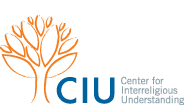Libertas Conference
Exploring Pathways to Peace
In the face of violence and escalating tensions in Ukraine, CIU Director Rabbi Jack Bemporad and Dr. Taras Dzyubanskyy, one of his former students, planned and hosted a conference in Lviv, exploring pathways for peace. The CIU-funded gathering was held at the Libertas Center for Interreligious and Interconfessional Understanding, a non-profit organization founded by Dr. Dzyubanskyy in 2013.
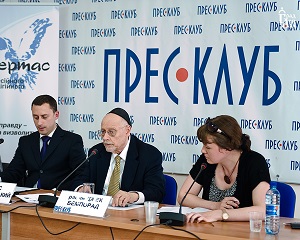
L-R: Dr. Taras Dzyubanskyy, Rabbi Jack Bemporad and translator.
The delegates, drawn from both religious institutions and the political sphere, including candidates in the current election there, addressed four basic issues: the current situation in the Ukraine, its causes and possible remedies; the role of religious leaders in stabilizing the situation; Nostra Aetate (the revolutionary document that dramatically improved the Catholic Church’s relationship with Judaism) and its influence on Jewish-Christian dialogue and finally, the role of religious leaders in stabilizing the current political situation.
Rather than focus on political and legal strategies for peace, the major thrust of the conference was an appeal to reawaken the spiritual mandate in all religions to fight hatred and to love one’s neighbor. Delegates also recognized the role media has been playing by broadcasting anti-religious propaganda targeted at different faiths. This has borne fruit in Eastern Ukraine, where anti-Semitic literature has been disseminated, albeit by a small minority.
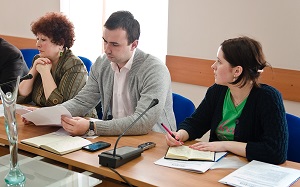
L-R: Adel Dianova, head of the Jewish Foundation in Lviv; Evgen Boyko, the Mayor’s representative of the Lviv City Council and Lidia Batig, Lviv City Council journalist.
Rabbi Bemporad asked the group, “What spiritual resources should be used to rectify this situation?” He asked the religious leaders to call upon the conscience of the people of the world to restore confidence in religion’s deepest values; love of God and love of neighbor. “In the case of Ukraine,” he said, “it’s time for all religious communities in your state to mobilize and unite against hatred, as individuals to give up selfishness and begin to defend the ideals of truth.”
Dr. Dzyubanskyy referred to the role of media in fanning the flames of hatred. “We also talk about the tragic events in our country, because we see that in the East and South of Ukraine there is the intimidation of religious minorities, Jews and Muslims.” He reiterated how this is counter to Nostra Aetate, which changed Catholicism’s appreciation of other religions, not only those founded in Christianity, but Buddhism, Islam and Judaism as well.
Religious expert Andrew Yurash continued in this vein, by citing the fact that the Ukraine was founded on the basis of equality, tolerance, and respect for Judaism and minorities. He said, “If a religious person grows to hate people of other religions, it negates his religious belief.”
The entire conference was posted on the websites of all the institutions represented at the event, and a prayer resolution was sent to all religious and political leaders. It received wide publicity in all major media in Ukraine.
This meeting was one of several Dr. Dzyubanskyy has hosted at the Center, in efforts to explore and find solutions to the current unstable political situation in Ukraine. He was an outstanding student of Rabbi Bemporad’s at the Pontifical University of St. Thomas Aquinas (Angelicum) in Rome, where Rabbi Bemporad is director of the John Paul II Center and Professor of Interreligious Studies. Dr. Dzyubanskyy obtained his Ph.D., Summa Cum Laude at the Angelicum, and since then the two have cooperated in a variety of interfaith endeavors, leading to the establishment of the Libertas Center in Lviv, of which Dr. Dzyubanskyy is the director.
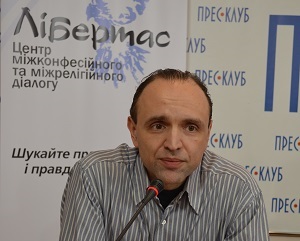
Alexander Ivaschenko, from Donetsk in Eastern Ukraine, who reported on the chaotic situation there.
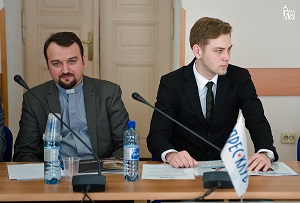
L-R: Rev. Roman Zavijskyj, Dean of the Faculty of Theology at the Ukrainian Catholic University of the Ukrainian Greek Catholic Church and Luka Karpjuk, Press-secretary and representative of Bishop Dymytrius of the Ukrainian Orthodox Church of Kyiv Patriarchate.
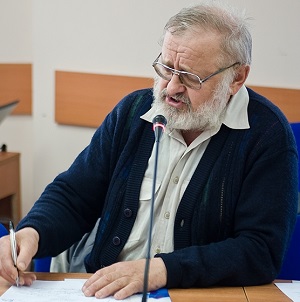
Mr. Roman Kis, Professor of Philosophy, writer, and representative of the Protestant community in Lviv.
